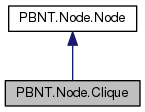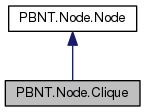 |
Quantum Fog
0.9.3
|
 |
Quantum Fog
0.9.3
|


Public Member Functions | |
| def | __init__ (self, nodes) |
| def | add_neighbor (self, sepset, node) |
| def | init_potential (self, node) |
| def | reinit_potential (self) |
| def | contains (self, nodes) |
 Public Member Functions inherited from PBNT.Node.Node Public Member Functions inherited from PBNT.Node.Node | |
| def | __init__ (self, id, index=-1, name="anonymous") |
| def | __lt__ (self, other) |
| def | __hash__ (self) |
| def | __eq__ (self, right) |
| def | add_neighbor (self, node) |
| def | remove_neighbor (self, node) |
| def | is_neighbor (self, node) |
Public Attributes | |
| nodes | |
| sepsets | |
| potential | |
 Public Attributes inherited from PBNT.Node.Node Public Attributes inherited from PBNT.Node.Node | |
| neighbors | |
| visited | |
| id | |
| index | |
| name | |
Clique inherits from Node. Clique's are clusters which act as a single node within a JoinTree. They are equivalent in JoinTrees to BayesNodes' in Bayesian Networks. The main difference is that they have "potentials" instead of distributions. Potentials are in effect the same as a conditional distribution, but unlike conditional distribtions, there isn't as clear a sense that the distribution is over one node and conditioned on a number of others.
| def PBNT.Node.Clique.init_potential | ( | self, | |
| node | |||
| ) |
We want to satisfy the formula self.potential = self.potential*P(node|node.parents).
 1.8.11
1.8.11